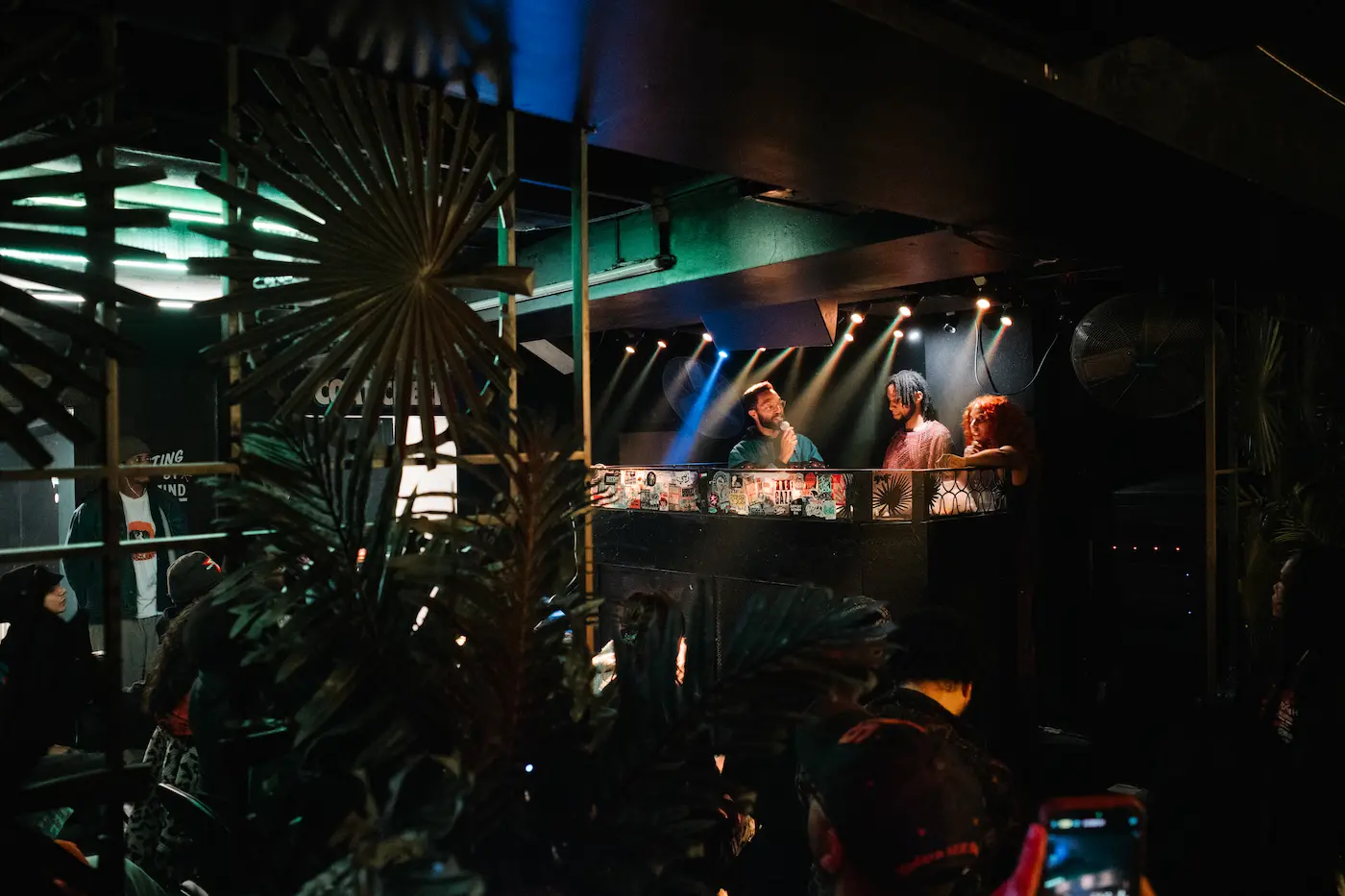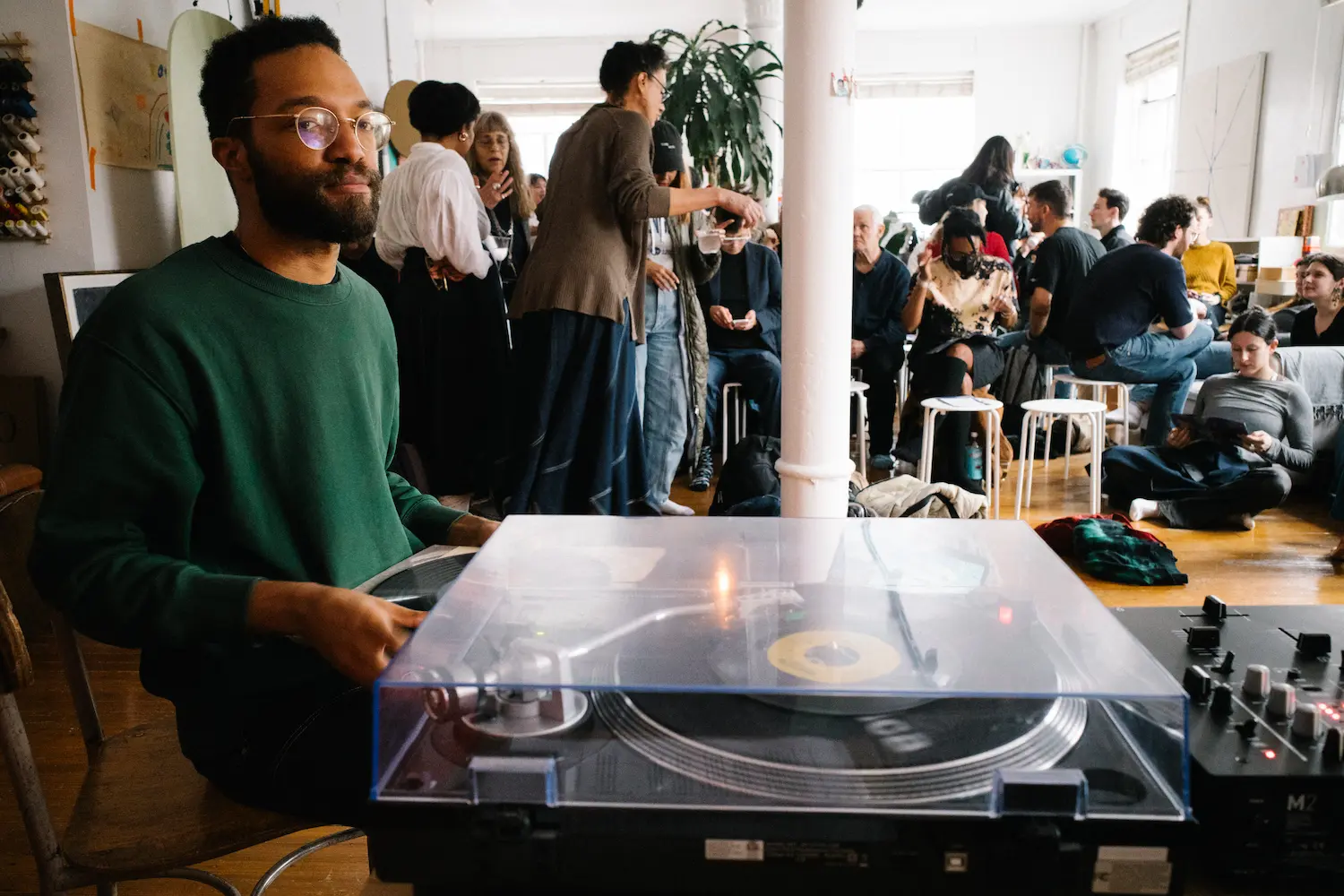Art Militant: Ryan Clarke's Exploration of Music, Culture, and Earth’s Passage of Time in the Black Community
Deltaic Listening with Sharifa Rhodes-Pitts & Ryan C. Clarke on March 16, 2025 as part of the listening series Living Equipment presented by Triple Canopy and RiversInstitute. Photo: Guarionex Rodriguez, Jr.
As a tonal geologist, Ryan Clarke spends his days researching systems and analyzing data to communicate the relationship between music, culture and earth, and how they affect the Black community. Ryan’s dual practice as a scholar and participant in the fields of geology and musicology has worked to develop an educational language behind his archival research and oration focusing on what he refers to as Earth’s “passage of time”. His work offers new perspectives on the spatial awareness of time, technology and the advancement of our earth by recognizing newer and older technology in the same space over time.
The sedimentologist helps us understand how he begins his process of gathering information for his research, “(We) start by quarrying the earth from 1 to 30 meters deep with a sort of pole used in science where the space inside the pole fills with organic materials as it deepens into the earth. When this tool is cut, we are able to examine and create science behind what’s found inside. In this process you explicitly observe changes in earth’s history and its influence whether from humans, a plantation, or maybe a chemical plant all happening in one spot. As you drive down into the research, you get a sense of the layered strata of not just colonialism but the extraction and manipulation through technology. At one point in the earth’s history, we were the new technology then as we advanced through time machines like the smoke stack, steam engine and even mass agriculture became a more centered focus for science.”
Human beings and technology have become separated in most modern conversations. Ryan circles back to the marriage between the software of man and machine by saying, “We are a part of the vertical stack of time while also experiencing it. This gave me a sense to speak about not only the scientific understanding of it but also focusing on our cultural place in time.” The artist and scholar goes on to add that technology will always work to increase positive energies but if left unchecked, inevitably leads to negativity.
Ryan recalls growing up in Baton Rouge, a suburban town that serves as a geographical, cultural and financial high ground 82 miles NW of New Orleans. As most Louisiana children will tell you, Ryan remembers his early days surrounded by the blues, jazz, soul and funk. This experience paired with the Black Southern Baptist Church as a foundation of expression, Clarke’s introduction to music was seamless and impactful. “I recognize if you're in your 50s and 60s, every week you get to go to your favorite concert to hear your favorite music that is directly connected to your understanding of the universe with all of your friends for free. I completely understand why we still should recognize the value of the phenomena that is the church.”
 The Right Address with Sweater on Polo, Frankie Decaiza Hutchinson, Ryan C. Clarke &
The Right Address with Sweater on Polo, Frankie Decaiza Hutchinson, Ryan C. Clarke &
special guests at Bossa Nova Civic Club on March 20, 2025 as part of the listening series Living Equipment presented by Triple Canopy and RiversInstitute. Photo: Guarionex Rodriguez, Jr.
He also acknowledges the organic third space our community has created through congregation, “we have rarely centered the white walls of the academy as a place of thought. I love how the bar, club, barbershops, the corner, and the studio all provide space for us to safely think, share and express together. I’m interested in reiterating and expanding on those ways of thinking together rather than the lecture way that happens in academia. Even in the concept of a lecture vs sermon, in a sermon you need the crowd as much as they need you.”
Ryan always envisioned himself in a lab working on various projects that align with his personal interests and in 2020, he found the conversation he had been looking for. While trying to overcome emotions and the new environments the pandemics forced on us, he was able to fight silence with sound, subsequently realizing how much time he had actually spent with music throughout his life and how it helped him shape his identity. One day, he stumbled upon a performance-lecture event hosted by Frankie Decaiza Hutchinson, founder of Dweller Electronics, titled “Who does techno belong to?”. After a bit of research, the ethnomusicology student flew to New York the next day for a lesson on Detroit culture. Afterwards, Ryan approached Frankie in hopes of helping her build this multidimensional conversation and from this introduction, the two have built a wonderful working relationship at Dweller where Ryan currently serves as co-editor and curator.
Ryan speaks on influence through counter institutions, giving credit to the trailblazers from the early days of electronic music in Detroit. It's Clarke’s love for programming like Detroit’s first black owned radio station, WGPR, who provided space and airways for Electrifying Mojo’s night show and television broadcast, “The Scene” (a movement that ignited dance music through the midwest) as a direct influence for his work as well as platforms like Arena and A8ball Radio who support the lineage of black thought and conception.
When asked about his intentions behind his most recent project “Deltaic Listening” with Triple Canopy, as part of “Living Equipment”, a new live event series presented with the Rivers Institute, Ryan simply responds with a question of his own, “How do we act as black music?”. Though a layered question at its core, Ryan and historian Sharifa Rhodes-Pitts together bring much understanding with their unique interpretation of New Orleans jazz, fusing the many sounds of the city’s shotgun houses with the bayou, two places for congregation and concealment for Black residents in the region. The full sensory experience was rounded out with gumbo and po’boys made by Scotty Fletcher to also allow guests a taste of the culture as well.
While a lot of Clarke’s references in science and sound support cultural identity for the Black community, he uses scientific studies to understand geopolitical debate and human rights issues in written pieces like “Where’s The Drop: Notes on Dance Music Ecologies” In this presentation, Ryan touches more on this subject in writing, “Stabilization in cultural spaces often follows a fated demise/reemergence paradox with the introduction of an innovative idea throwing convention off its axis only to achieve another valance state. Like a phoenix rising and dying by its own ashes, delta blues begets rhythm and blues begets soul begets rap, etc. etc. This unstable growth-decay is intralinked with the environmental and cultural geographies that artists inhabit. This beauty of creative communal intelligence is the cornerstone of cultural creation.”
Ryan Clarke continues to create an “underground resistance”, a phrase he often uses when referring to music as a cultural entry point personifying itself as sonic protest but also social education. The scholar is truly interested in documenting culture and recording what happens to space when someone from outside of it projects their own hierarchy upon it. Ryan’s political dialogue raises awareness to support the idea that the infiltration of black culture directly relates to the rise of popular culture with a simple yet forceful response, “Black social death is the foundation of civilization.”



